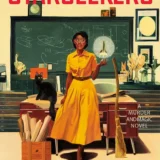For those that don’t know, I’ve been published just about every way there is: small-press, big-five, and self. Despite all the partisan rhetoric out there about which way is “best” I can tell you that each route has advantages and disadvantages. I myself recently turned down a five-figure advance from a large publisher and accepted a four-figure advance at a small one because I was getting amazing contract terms. I’m sure that in the long run my strategy of selling off print and audio rights myself, while maintaining my ability to the e-rights, will win out in the end.
But too often I see aspiring offers taking small-press deals that aren’t in their best interests. I think some feel that “any deal” is better than “no deal” and I don’t think they fully understand what they are getting into. So today’s post will hopefully shed some light on when a small press is a good decision and what you should be looking for.
Print distribution
For the sake of this article, I’m going to be focusing on small presses that are offering print distribution. There are a lot of “digital-only” small presses and to be honest I know of very few instances where that would be a good way to go. If you want to learn more about why I say that checkout my previous article: Digital Only Publishing — Think Twice Before You Sign.
When it comes to small publishers doing print they usually fall into one of two categories:
- Those that do a print run and have a distribution partner
- Those that use print-on-demand technology
I think this is one of the first things you need to determine about any small-press you consider signing with. Those doing print-on-demand have essentially the same capabilities that you do as far as getting our books distributed. What this primarily means is that you can sell some print books online (at Amazon, Barnes and Noble and the like) but very few, if any, will be sold through stores. The reason is because stores really don’t buy and stock books; they get them more or less “on consignment.” In other words their shipment of books comes without them outlaying any cash…and when the bill comes due they can opt to ship back the unsold copies “for credit.” This types of system doesn’t work for a print-on-demand title as someone—and it won’t be the bookstore—needs to pay upfront before the book is printed. For this reason few print-on-demand books will make it to bookstore shelves.
The small press I recently signed with, Tachyon Publications, does indeed do print runs, and they have used IPG (Independent Publishers Group) in the past and are moving to PGW (Publishers Group West) starting in January for their distribution. Both of these organizations are highly respected, employ teams of sales people, and are adept at getting books by the small-presses using them into the bookstores. With partners such as this I felt comfortable signing on with them for Hollow World.
There is one more form of small press distribution and that is a small publisher that uses the distribution chain of a larger publisher. Some examples of these include: DAW (who distributes through Penguin) and Angry Robot (who distributes through Random House). Again both models produce similar results…getting books onto bookstore shelves which is one of the essential reasons for going with a publisher in the first place.
When you are considering a small press be sure to find out from them whether they do print-on-demand or are doing a print run. If they are doing a print run they should be willing to share the name of their distributor so you can do some research on them online before signing.
Examine Their Existing Sales
I pay to have access to Neilsen’s Bookscan—the industry standard for reporting print book sales—so I could see from those reports that Tachyon has a proven track record for selling tens of thousands of books. But what about those who don’t have this resource? Easy. Checkout out their Amazon rankings (for both print and ebooks if you are selling both rights). Use the Amazon’s Sales Rank site and specify the name of the publisher and the do a search on them for print, then for ebooks. If all their print titles are in the 500,000 or higher ranks then they really aren’t moving any appreciable print books. If they have some titles in the 20,000 – 200,000 then they are pretty good traction for a small press. If they have print books rankings in the 1,000 – 2,000 range they are doing REALLY well. For ebooks you’d like to see at least a few titles in the sub 10,000 ranking range and if you are seeing ebook sales in the sub 1,000 they are doing really well. When checking rankings, be sure to check the release dates. Books available for pre-order usually sell poorly and it’s not unusual for them to have high rankings. The only ones you should care about are those actually for sale.
Editing
You should discuss with your small publisher what their standard practice is with regards to publishing. There are small presses out there that will release your book exactly as it was submitted to them. This should be a huge red flag. The whole reason you are willing to give up a substantial amount of the profits is for the services they are providing – editing being one of the most important. If they aren’t going to edit you, then why not just self-publish?
Contract terms
One of the biggest reasons I signed with Tachyon Publications is they have a very “author friendly” contract. I see this as one of the chief advantages that smaller presses have over the big-five. What types of things am I talking about:
- Term: I have a fixed-length term of 4 years as opposed to my length-of-copyright term with the five books I have with the big-five
- eBook Royalty Rates: big-five is 25% of net across the board. I’ve seen small press percentages generally run 35% – 70% to the author—in my case I sold only print rights to Tachyon so my rate is 100% 😉
- Less rights “grabby”: you are more likely to retain foreign translations, audio rights, and graphic novel rights when dealing with a small press. The big-five generally insist on book/print/audio rights and will usually push for World Rights as opposed to just English rights.
- Better out of print reversion terms: again because my contract is print only out-of-print rights are pretty straight forward—when the warehouse is empty it’s out of print. When there is an ebook component then it is important to determine at what level of sales the rights will revert. For big-five this threshold is very, very low (ensuring it will probably be with them virtually forever). If you get a fixed term contract then you’re guaranteed when the rights will revert, and if it is a life-of-copyright contract I suggest you be a bit aggressive for the threshold level of income to remain “in print.”
Flexible terms should be one of the advantages of a small press deal. Don’t sign up with a small press that is asking for similar terms of the big-five with little ability to exploit rights they may take but not exercise.
Marketing
I mention this because you shouldn’t be concerned that you won’t get much (or any) marketing dollars as part of a small-press deal. If you are a debut author, you’ll not see that with your big-five publisher either. But there are some low cost things that they should be doing on your behalf. Things like making ARC copies available to reviewers and submitting them to organizations like Publisher’s Weekly, Kirkus, and Library Journal. I was surprised that Tachyon assigned me a publicist. To be honest, I wasn’t expecting one. So far I’ve been very impressed with his efforts on that front even though we are about five months out from release. Bottom line, look at any marketing help from a small press to be a good sign, but not getting any doesn’t mean it’s a deal breaker.
Advance
Like marketing I mention this just to point out that not getting an advance is not necessarily a deal breaker. As I’ve said, I received a four-figure advance for Hollow World but many small presses simply can’t afford to do this. Considering how small the advances are, and that they are just a form of a no-interest loan, not having one shouldn’t be a problem.
Award nominations
One of the reasons I went with Tachyon is their reputation for quality. Even as a small press they get shortlisted (and win) Hugos and Nebulas. Again, this should go in your “nice to have” checkmark list and not necessarily be a deal breaker. After all competition in such awards is firece and more often than not the nominees are going to be from the large presses. This is just the nature of the game.
Summing it up
No matter which route you choose, there are bad ways and good ways to get the book print. When choosing a small press it’s important that they are offering a real value add to what you can do on your own, otherwise…you might be better off with a do-it-yourself option. Things to look for are great distribution partners, past track record, and the terms of their contracts. I think there is a huge gap right now being filled by many small publishers because of the “hard-party-line” that is prevalent in the big-five world. Botom line, if they are bringing to the table value that you can’t get on your own then it makes sense to sign on with a partner—even if they aren’t the biggest in the industry.
Michael J. Sullivan is a speculative fiction writer who has written twenty-five novels and released nine. Eight of his fantasy books (The Riyria Revelations, and The Riyria Chronicles), were published by Hachette Book Group’s Orbit imprint. Hollow World, a science-fiction thriller was released by Tachyon Publications. The first four books of his new series, The First Empire, has sold to Random House’s Del Rey imprint, and the first book is scheduled to be released in the summer of 2016. He can be found on twitter, through his blog www.riyria.com, and on his facebook page and his publisher’s page for the series.









